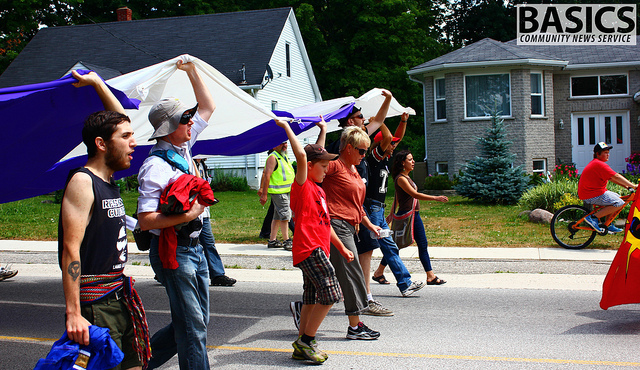Why We Should All Support Their Struggle

by Laura Lepper
You have probably never heard of a small, rural town in Southgate Township called Dundalk. But its location is significant.
The town is situated at the highest elevation in Ontario, the headwaters of both the Grand and Saugeen rivers, and sits on land deeded to the Six Nations through the Haldimand Proclamation of 1763.
Despite the ecological importance of the region and the outstanding land claim, the Southgate municipal council and Lystek International Inc. are attempting to secretly force through a plan to build a “bio-solids” processing facility just a stone’s throw from the town.
The process and product are banned in much of Europe.
This project would involve trucking Toronto’s sludge – including everything flushed down sewers, toilets, and sinks in homes, hospitals and industry – up to Dundalk to be turned into a “fertilizer”.
This sludge plant is set to be built on land that is practically sitting on water surrounded by wetland.
The sludge would then be spread on farm fields – meaning our food, water and land would be poisoned by sludge.
“Three applications of these biosolids on the land and it’s dead,” says Doyle Prier who lives on a nearby farm.
Lystek and the town council’s plans have been met with powerful resistance from local residents and Six Nations community members alike.
After exhausting the official government channels, concerned Dundalk residents approached Six Nations for assistance in their opposition to the sludge.
Southgate township resident Lori Prier remarks “We hadn’t heard of our council consulting Six Nations … and I became very concerned … because it’s their land.”
Dundalk sits at the very top of the Haldimand Tract, the territory stretching six miles on either side of the entire Grand River, recognized by the British Crown in 1784 as a territory which was specifically granted to the Mohawks and other members of the Haudenosaunee Confederacy in return for losses suffered for supporting the British side in the war of American Independence.
Sharing concern for the land, the health of their communities and future generations, members of Six Nations have been working together with Dundalk residents to stop construction of the sludge plant.
Because Six Nations people drew a line in the sand saying the construction could not continue on their lands, Dundalk residents were given Haudenosaunee flags to fly on the frontlines of their resistance.
For about 100 days, they held a blockade in the name of Six Nations land rights where they stopped all construction on Lystek. Several organizers are now fighting lawsuits and an injunction.
“As we work to protect the land, in many ways we have a common struggle with Six Nations,” states Dundalk resident Mike Roth.
Echoing many other Dundalk residents, Paul Chatterbull stresses that, “if we don’t work with Six Nations, we have no hope whatsoever.”
This struggle is not only important to support because of the disastrous effect on communities’ health, water and food security this project would have; it is also a living example of the concrete links that are possible between environmental justice and Six Nations land rights, between people seeking justice for non-native and native working class people through the advocacy of Indigenous sovereignty.
Concerned Torontonians should also pay attention because it is our waste products that are planned to be dumped in Dundalk, requiring pending approval of the Toronto Works committee.
Our water and our food will be affected.
Furthermore, this environmentally destructive project would violate both the spirit and the letter of the treaties which allow non-native people to be on this land.
For information on how to get involved with either Six Nations solidarity activities, contact the Toronto First Nations Solidarity Working Group. Email april28info (at) gmail (dot) com. Find out more info at april28.net. Follow @TorontoFNSWG on Twitter.
Comments